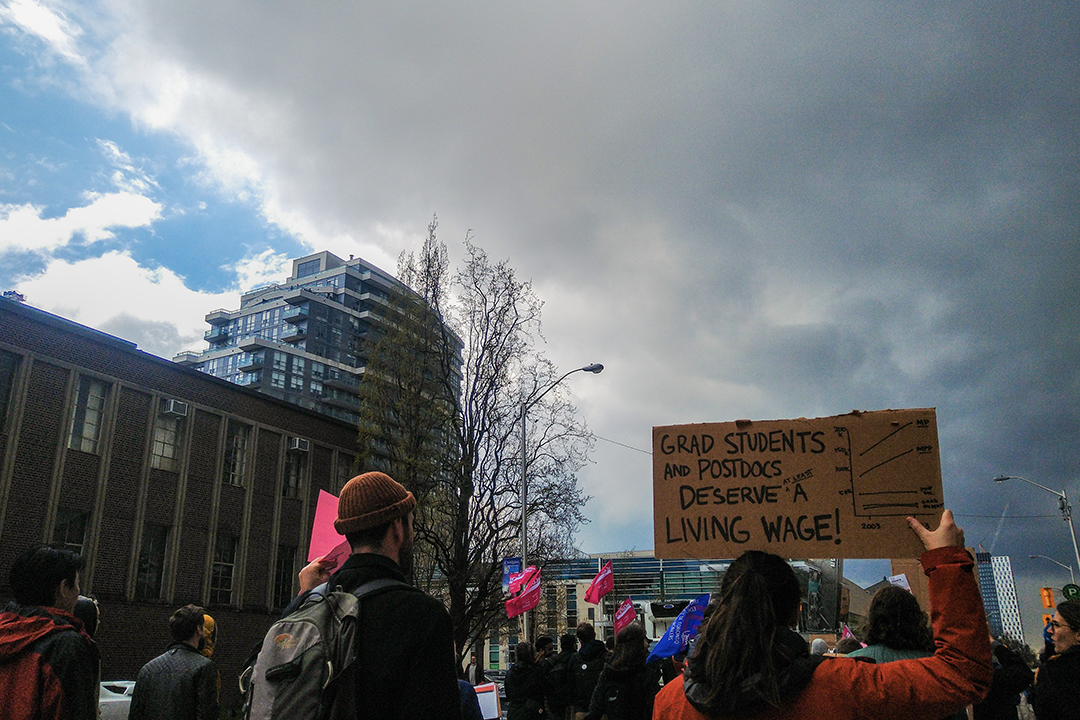On May 1, hundreds of U of T students and staff participated in a walkout that started on the St. George campus, calling for the federal government to devote more funding to scholarships, fellowships, and grants for natural science and engineering graduate students and postdoctoral researchers. Community members organized the protest as part of a nationwide day of action started by Support Our Science, a grassroots organization advocating for higher graduate and postdoc pay. Thousands of students, union members, and other workers across 45 Canadian universities took part in the day of protest.
The walkout
On the day of the protest, over 200 U of T community members gathered outside of Sidney Smith Hall to prepare for the protest and create signs. The protesters then walked along St. George Street and across Bloor Street to Minister of Finance Chrystia Freeland’s office, where some protesters delivered speeches. At her office, they left personal letters, an open letter from Support Our Science signed by thousands of Canadian researchers, and a copy of a petition that was submitted to the House of Commons.
The protesters sought to highlight the lack of funding in the 2023 federal budget for graduate students and postdocs — employees who have received their PhD and continue to conduct research at a university, usually with a mentor’s guidance. Seventy-six per cent of Canadian researchers studying engineering and the natural sciences are backed by the Natural Sciences and Engineering Research Council of Canada (NSERC), a federally-governed organization that awards approximately 8,800 grants, scholarships, and fellowships annually. However, funding levels for grants and scholarships meant to cover student and postdocs’ cost of living — including from the Postdoctoral Fellowships program, the Canada Graduate Scholarship – Masters (CGS-M) program, and the Postgraduate Scholarship – Doctoral program — have stagnated over the past 20 years, with stipends for the latter two packages remaining the same since 2003.
Marc Johnson, a U of T biology professor and alum, helped organize the Toronto protest. “I got one of these fellowships/scholarships from the federal government in 2003 and students today are being paid the exact same amount,” he said in an interview with The Varsity. For the December 2022 cycle, NSERC allocated 77 CGS-M awards to U of T. Each award consists of a $17,500 stipend for one year — far below the $24,720 Toronto poverty line estimated by Statistics Canada in 2022.
“Many of these graduate students haven’t seen a raise from the federal government in 20 years, despite [around] 50 per cent inflation during that time,” Johnson said. “As a result, the federal government is forcing graduate students and postdocs to live in poverty.”
According to the open letter from Support Our Science, low stipend amounts disproportionately impact marginalized students and those with families or other responsibilities, as they cannot rely on external financial support and may have to “forgo taking these prestigious awards” to look for other work.
Celina Baines, an assistant professor in U of T’s Department of Ecology and Evolutionary Biology, participated in the walkout. “In order for us to keep science thriving in Canada and for us to recruit top Canadian talent, we need to be paying them a liveable wage,” Baines explained in an interview with The Varsity. “We are only able to do research because we have students and postdocs who are doing amazing work.”
For international PhD students Menna Alnahas and Anupama Sharan, making less than a living wage puts them in a “precarious” financial situation. “We have to work tremendous hours as [teaching assistants] to make ends meet, so we’re very distracted from our research,” said Alnahas in an interview with The Varsity.
Demands
In their open letter, Support Our Science called on the federal government to increase the value of graduate scholarships and postdoctoral fellowships to reflect inflation since 2003, to index scholarships and fellowships to rise with inflation going forward, and to increase the number of fellowships to reflect the increase in graduate students. To ensure that increasing NSERC funding doesn’t result in cuts to other disciplines, the organization also demanded that the government increase its tri-agency research grant budget — which funds the NSERC, as well as two other national agencies focused on health, social sciences, and the humanities — by 50 per cent.
In a tweet, the organization drew attention to the 2023 Report of the Advisory Panel on the Federal Research Support System, also known as the Bouchard Report. Written by a government committee that launched in 2022, the report called on the federal government to increase investments for graduate and postdoctoral fellows and to increase funding to an internationally competitive level. The report notes that “[graduate and postdoctoral] research and innovations are crucial to helping us answer environmental, social and health challenges facing our country and the world such as climate change, food security, and pandemic preparedness.”
In a statement to CBC News, a federal science ministry spokesperson did not comment on whether the government would ensure that scholarship amounts increase. They noted that the 2023 budget commits the federal government to increase student loan limits and devotes an additional $813.6 million to increase student grants.
With files from Sarah Artemia Kronenfeld.


